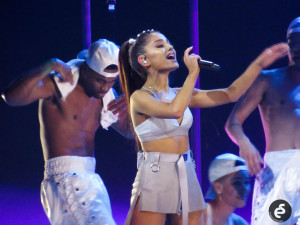A breakup with Ariana Grande has been long overdue. She wasn’t on my radar until her fourth album “Sweetener,” which just won a Grammy for best pop vocal album, was released in 2018. I appreciated her candid lyrics about her struggles with anxiety and trauma, both themes I can relate to. I was looking forward the release of her latest album “Thank U, Next,” but as her skin seemed to darken a shade with each single she dropped, I grew more and more wary.
Like many white artists, Grande has been culturally appropriating heavily. While photos of young Grande show her with pale skin, it has progressively darkened through the use of fake tanning. Along with her darkening skin tone, the way Grande speaks has also been changing. She has been accused of developing a “blaccent,” and trying to sound like a Black woman during interviews to appeal to a larger fan base and become relatable to more people.

Her hit single “7 rings” and the song’s music video received backlash for multiple counts of cultural appropriation. The song is a rap and R&B song, which The Atlantic writes is “inspired by—or taking from—Black artists.” After the song was released, both Soulja Boy and Princess Nokia suggested that parts of Grande’s song were stolen from their songs. Princess Nokia compared “7 rings” to her song “Mine.”
“Ain’t that the little song I made about brown women and their hair,” Princess Nokia said about “7 rings” in a video on Twitter. “Sounds about white.”
Grande’s lyrics “I want it, I got it” are already similar to Princess Nokia’s lyrics “It’s mine, I bought it,” and Grande sings them to nearly the same tune. But it doesn’t end there. In the video for “7 rings,” Grande’s skin looks darker than ever. The video depicts a pink mansion, which 2 Chainz suggested was copied from his pink trap house.
Along with the appropriation of Black culture present in “7 rings” and its video, Grande also takes from Japanese culture. The video begins with the title of the song in English and Japanese, and there are bottles with Japanese writing on them throughout the video. However, Grande takes it a step further and attempts to get “7 rings” tattooed on her hand in Japanese. But in the spirit of culturally insensitive and ignorant white people, Grande’s tattoo ended up translating to “barbecue grill.”
Along with the cultural appropriation, Grande was accused of “queerbating” in her latest music video for her song “break up with your girlfriend, i’m bored.” In the video, Grande is flirting with actor Charles Melton, only to end up going in for a kiss with his girlfriend in the final scene. Although Grande supports her openly gay brother and has been an outspoken supporter of LGBTQ+ rights over the years, she has never said whether or not she is part of the community. The video feels less like a show of support and more like an attention-grabbing publicity stunt.
While Grande has been desperately grasping for cultures to try on at rapid speed, the internet has noticed. She has been under fire on Twitter for the appropriation and doesn’t seem to know how to handle it. Instead of listening to the accusations and educating herself on what it means to culturally appropriate as a white woman, she is taking to Twitter claiming that her tattoo “was done out of love and appreciation,” and that it was “an honest mistake.” When referring to the backlash her actions caused, Grande ironically tweeted that her feelings were hurt, and that “no one considers feelings other than their own.”
Grande has gotten herself into trouble on Twitter before. After Chinese-Canadian singer Kris Wu released his debut studio album “Antares” in November, he held six of the top seven spots on iTunes U.S. charts when Grandes single “thank u, next” was in fourth. Grande liked a tweet that insinuated that bots were responsible for the success on the charts. The like was a hurtful way of discrediting the huge success of a crossover Asian artist in the U.S.
Don’t let the fake tan fool you. Grande is indeed a white woman, and her multiple accounts of cultural appropriation and disregard for the people she’s offended is damaging and hurtful to people of color and cultures she has appropriated. While she has received some criticism, Grande has received an immense amount of praise for her new album. As we heard her sing about it in “7 rings,” Grande has become hugely successful. While the “blaccent,” clothes, lyrics and skin tone she appropriates have been used as reasons to hurt and oppress the people she stole them from, they have only led her to gain more success. Grande claims that it’s simply “appreciation,” but we’re not buying it. No thank you, next.
